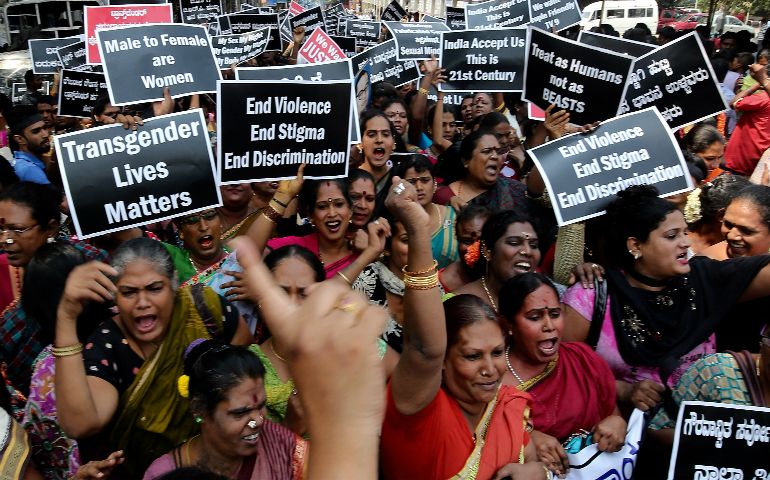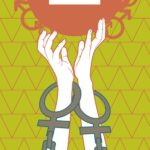Transgenders of India- eunuch, hijras, kinnars, aravalis or joggapa as they are commonly known, have
endured and persevered a long, arduous battle to attain legal recognition of their gender identity, and
human rights in an attempt to transition their lives from the state of being legally invisible onto full
citizens, from stigma and shame onto dignity and respect, and from deprivation onto entitlements.
Whilst, this crusade seemed to have ended in a glorious victory in April 2014 with Supreme Court’s
landmark judgment in NALSA case (National Legal Services vs Union of India); January 2019 still sees the
Transgender Persons Bill languishing, shrouded in contention and dissidence, invoking protests by
transgender community from all over the country to stop its passage. The 2016 version of the Bill is
replete with provisions that will further disempower, marginalize and criminalize transgenders.
A significant pronouncement of Supreme Court as part of the judgment was the affirmative action of
“reservations” for transgenders in educational institutions and public appointments (para 60, The Rights
of Transgender Persons Bill 2014). Being a positive right, this was the single most important step in
fostering inclusion of transgenders into the mainstream society, but it was not upheld in the 2016 Bill.
This provision was amended and now stands bereft of the promising undertone, and lacks force of a
definitive action to ensure admittance of transgenders into public life.
A lamentable state of existence marked by discrimination, exclusion and poverty, thus, continues for the
sizable 4.9 lakh hijra community. This is such a disgrace for country like India that boasts of being
‘incredible’ by positioning herself as the world’s “spiritual hub” and as world’s largest “democracy”.
Whereas in reality, it is the under the label of morality and religion that modern-India has continued to
inflict misery upon transgenders, and deprive them of their human rights.
From Demigods to Outcasts
Transgender have existed since time immemorial and across all parts of the world. Historically, they
were treated with much reverence in India. Hindu religious/spiritual philosophy acknowledged them as
the third sex or tritya prakrati, and considered them as demigods/ ascetics of a high order with spiritual
powers that came from renunciation of sexual pleasures. Further, Hindu mythology has it that
transgenders were blessed by Lord Rama, who conferred upon them the power to bless or curse other
humans, especially in context of marriage and fertility. Thus their presence at marriage or child birth is
considered auspicious even today.
Societies in Vedic period accepted transgenders as a part of the society where they thrived in
accordance with their gender identity, pursued a livelihood and were not demeaned in any way.
Later, during the ancient and medieval period (circa 13th century), Muslim rulers in India also capitalized
on the human capital of eunuchs. They construed their sexual incapacity as the hallmark of their fidelity,
and thus deployed them as guards of queen’s chambers and harems. Overtime, they rose to important
political positions, especially during the reign of Khiljis and Mughals, and enjoyed rare privileges and
powers in the royal kingdoms.
However, post-independence era has seen hijras live in deplorable conditions. Despite their deep faith in
Hindu Scriptures, an unflinching devotion to Lord Shiva’s androgynous form -Ardhnareshwar, and cognizance of mythological characters like Shikhandi and Brihnala, Indian society has shunned hijras as
“deviants” to the patriarchal gender construction (of male-female binary); condemned and despised
them as sexually immoral beings (homosexuals); and discarded them as nature’s ‘manufacturing defect’
owing to their procreative inability. They are treated as outcasts and untouchables, and relegated to
lowest echelons of society-disenfranchised, ostracised by family, friends and community, violated,
beaten, sexually abused, humiliated, scorned at public places- streets, bus stands, train stations, shops
for the way they look, dress, talk, behave; and deprived of human rights, with no legal protection
whatsoever.
It is as if the society and the State conspired to push them into subliminal existence as a way to punish
them for “transgressing” patriarchal gender norms by “exercising choice” in relation to their gender
identity/expression and sexual orientation; which in reality is for no fault of theirs. Let alone
participating in public life, the society starved them into begging, prostituting or into trading-off their
power to bless, or, shall we say, the society’s fear of curse, to extract money from families at marriages
and child births.
It is shameful that despite their physical and mental adequacy, the State and society failed to create
avenues for constructive engagement of hijras into meaningful pursuits, vocations or professions that
could have served the society, and conferred a life of dignity upon them. Here’s a set of dialogues from
the Bollywood Movie Shabnam Mausi (biopic of transgender Shabnam Bano), where the protagonist
agonises and questions the society’s estrangement of them:
“Hum aulaad paida nai kar sakte, lekin hum anaaj to paida kar sakte hain;
Pad likh kar doctor, engineer ya kala guru to ban sakte hain;
Jaise hum sab logon ko duaen bante hain,
waise unke such dukh ki chithiyan to unke ghar pohoncha sakte hain”.
It is said that the mark of a civilized society is in how it treats its under-privileged and the marginalized.
It is in this context that the true image of a society is revealed. Modern-day India does not reflect a
society that has imbibed the essence of religion, spirituality or even democracy. Rather it depicts a
society that has regressed to become completely divested in ‘humanity’, a blatantly cruel and brutally
patriarchal society that has completely lost touch with basic human sentiments, a shared sense of pain
and suffering with fellow humans, and the understanding of universal human quest for justice, respect
and happiness.
As a matter of fact, some transgenders, in spite of their experience of extreme social hostility,
circumstantial adversity and administrative blockades did not succumb to a life that the society had
destined for them. Instead, the constant smouldering of their inner passion and resolve, has led them
set ablaze the shackles of social repression and they took the road less travelled. People like Laxmi
Narayan Tripati (rights activist, represented Asia Pacific at the UN), Satyasri Sharmila (lawyer registered
with bar council), Jyoita Mondal (Judge of Lok Adalat), Prithika Yashini (Police Officer), Manabi
Bandopadhay (PhD and professor), Shabnam Mausi (MLA), Shabi (soldier), Kamla Jaan (Mayor), Kalki
Subramanium (artist, actor, rights activist and entrepreneur) are among the “first transgenders” in their field and are making valuable contribution to society through their work. This is a validation as to just
how far they can go, if given access to rightful opportunities to education and employment.
Having missed out on the reservation clause in the final Bill, Central government has displayed a lack of
political will in providing equal opportunities to transgenders. From demigod to outcasts, their lives have
been deeply inflicted by State’s failure to safeguard their fundamental rights. It is high time that
government moved from merely adding a gender marker of “third gender” to do something concrete for
them. Upholding reservations will be a major step towards not only stamping out destructive social
attitudes, fostering social acceptance for this community and in unlocking this human resource for
society and the nation.
Our guest author, Ms. Gugush Chopra holds a Master’s degree in Human Rights Law from University of Nottingham, UK and specializes in women’s human rights. She’s passionate about rights of women and transgenders to live a life free of sexual violence and exploitation; and has previously worked in the UK in the women’s rights sector.





